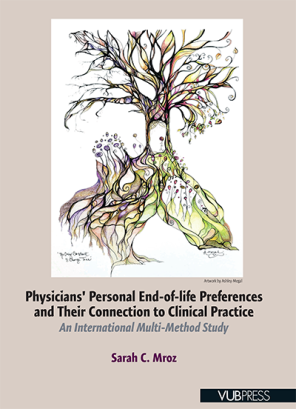Author: Sarah C. Mroz
Date: 14-03-2025
Supervisors:
Prof. dr. Koen Pardon, Vrije Universiteit Brussel Prof. dr. Luc Deliens, Vrije Universiteit Brussel Dr. Frederick Daenen, Vrije Universiteit Brussel Prof. dr. Kenneth Chambaere, Ghent University Prof. dr. Freddy Mortier, Ghent University
Abstract
Physicians play a key role in end-of-life decisions, which are of increasing importance as the global aging population expands and people live longer with extended illnesses. In developed countries, half of all deaths are preceded by at least one end-of-life decision, including withholding and withdrawing treatment, palliative sedation or assisted dying, among others. There is evidence to suggest a connection between physicians’ personal preferences and their own clinical practice. However, there is a lack of knowledge on physicians’ end-of-life decision preferences and how those preferences impact their clinical decision-making. Exploring this link is crucial as physicians have significant influence on patients and health care systems. Gaining a better understanding will require exploring various factors including cultural, religious, sociocultural and jurisdictional influences.
The PROPEL study (Physician Reported Preferences for End-of-Life) seeks to gain an in-depth understanding of physicians’ personal preferences on end-of-life decisions, how preferences impact their clinical practice and how various factors influence preferences. A multi methods approach is used including a quantitative survey in five countries: Belgium, Italy, Canada, USA (Georgia, Oregon & Wisconsin) and Australia (Queensland & Victoria); combined with a qualitative exploration using semi-structured interviews in Belgium, Italy and the USA (Wisconsin). As end-of-life options are expanding around the world, exploring these issues will allow for international comparison and knowledge sharing that will address complex moral and clinical issues related to end-of-life care.


